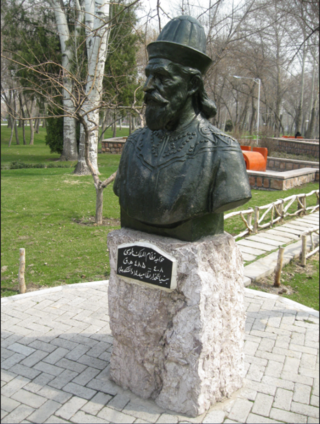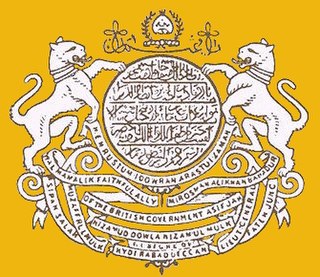
Bajirao I was the 7th Peshwa of the Maratha Confederacy. He, after Shivaji, is considered to be the most charismatic and dynamic leader in Maratha history. He was just twenty years old and already had a reputation for rapid decisions and a passion for military adventure.

Hyderabad State was a princely state in the Deccan region of south-central India with its capital at the city of Hyderabad. It is now divided into the present-day state of Telangana, the Kalyana-Karnataka region of Karnataka, and the Marathwada region of Maharashtra in India.

Mir Qamar-ud-din Khan Siddiqi also known as Chin Qilich Qamaruddin Khan, Nizam-ul-Mulk, Asaf Jah and Nizam I, was the first Nizam of Hyderabad.

Abu Ali Hasan ibn Ali Tusi, better known by his honorific title of Nizam ul-Mulk, was a Persian scholar, jurist, political philosopher and vizier of the Seljuk Empire. Rising from a low position within the empire, he became the de facto ruler of the empire for 20 years after the assassination of Sultan Alp Arslan in 1072, serving as the archetypal "good vizier". Viewed by many historians as "the most important statesman in Islamic history", the policies implemented by Nizam ul-Mulk remained the basic foundation for administrative state structures in the Muslim world up until the 20th century.

The princely state of Hyderabad was annexed by India in September 1948 through a military operation code-named Operation Polo, which was dubbed a "police action".

Nizam of Hyderabad was the title of the ruler of Hyderabad State. Nizam is a shortened form of Niẓām ul-Mulk, and was the title bestowed upon Asaf Jah I when he was appointed Viceroy of the Deccan by the Mughal Emperor Farrukhsiyar. In addition to being the Mughal Viceroy (Naib) of the Deccan, Asaf Jah I was also the premier courtier of the Mughal Empire until 1724, when he established an independent realm based in Hyderabad, but in practice, continued to recognise the nominal authority of emperor.

Mir Osman Ali Khan, Asaf Jah VII was the last Nizam (ruler) of Hyderabad State, the largest state in the erstwhile Indian Empire. He ascended the throne on 29 August 1911, at the age of 25 and ruled the State of Hyderabad between 1911 and 1948, until the Indian Union annexed it. He was styled as His Exalted Highness (H.E.H) the Nizam of Hyderabad, and was widely considered one of the world's wealthiest people of all time. With some estimates placing his wealth at 2% of U.S. GDP, his portrait was on the cover of Time magazine in 1937. As a semi-autonomous monarch, he had his mint, printing his currency, the Hyderabadi rupee, and had a private treasury that was said to contain £100 million in gold and silver bullion, and a further £400 million of jewels. The major source of his wealth was the Golconda mines, the only supplier of diamonds in the world at that time. Among them was the Jacob Diamond, valued at some £50 million, and used by the Nizam as a paperweight.

Chowmahalla Palace or Chowmahallat is the palace of the Nizams of Hyderabad State located in Hyderabad, Telangana, India. It was the seat of power of the Asaf Jahi dynasty (1720-1948) and was the official residence of the Nizams during their reign. Presently the palace is converted into a museum but the ownership still lies with the family.

King Kothi Palace or Nazri Bagh Palace is a royal palace in Hyderabad, Telangana, India. It was the palace where the erstwhile ruler of Hyderabad State, Sir Mir Osman Ali Khan, the seventh Nizam, lived. It was a palace bought by his father Mahboob Ali Pasha, who had a penchant for buying ostentatious homes.

The Asaf Jahi was a Muslim dynasty that ruled the Hyderabad State. The family came to India in the late 17th century and became employees of the Mughal Empire. They were great patrons of Indo-Persian culture, language, and literature, and the family found ready patronage.

Nizam's Museum or H.E.H Nizam's Museum is a museum located in Hyderabad at Purani Haveli, a palace of the erstwhile Nizams. This museum showcases the gifts that the last Nizam of Hyderabad State, Osman Ali Khan, Asaf Jah VII received on his silver jubilee celebrations. The museum is a repository mainly of souvenirs, gifts and mementos presented by dignitaries to the last Nizam on the occasion of the silver jubilee celebrations in 1936. Models made of silver of all the landmark buildings in Hyderabad, with citations about them in Urdu.

The Sultanate of Ahmednagar was a late medieval Indian Muslim kingdom located in the northwestern Deccan, between the sultanates of Gujarat and Bijapur, ruled by the Nizam Shahi dynasty. It was established when Malik Ahmed, the Bahmani governor of Junnar, after defeating the Bahmani army led by general Jahangir Khan on 28 May 1490, declared independence and established the Ahmadnagar Sultanate.

Nizam's Guaranteed State Railway (NGSR) was a railway company operating in India from 1883 to 1950. The company began with a line built privately by the HEH, the Nizam, which was owned and operated by the company under a guarantee from the Hyderabad State. Capital for the line was raised by issuing redeemable mortgage debentures. The Nizam's railway was eventually consolidated with the Hyderabad-Godavari Valley Railway (HGVR). In 1951, both the NGSR and the HGVR were nationalised and merged into Indian Railways.
Viswaroopan ("Viswa") Sadasivan was a Nominated Member of Parliament (NMP) in the Parliament of Singapore from 2009 to 2011.

The siege of Trichinopoly was part of an extended series of conflicts between the Nizam of Hyderabad and the Maratha Empire for control of the Carnatic region. On 29 August 1743, after a six-month siege, Murari Rao surrendered, giving Nizam ul Mulk (Nizam) the suzerainty of Trichinopoly. By the end of 1743, the Nizam had regained full control of Deccan. This stopped the Maratha interference in the region and ended their hegemony over the Carnatic. The Nizam resolved the internal conflicts among the regional hereditary nobles (Nawabs) for the seat of governor (Subedar) of Arcot State, and monitored the activities of the British East India company and French East India Company by limiting their access to ports and trading.
Mohamad Shahrul Nizam bin Ros Hasni is a Malaysian professional footballer who plays for Malaysia Football League club Terengganu FC as a centre-back.
Muhammad Sharul Nizam bin Mohd Nadzir is a Malaysian footballer who plays as a winger.
The 2020 season is Young Lion's 17th consecutive season in the top flight of Singapore football and in the S.League.
Sharul Nazeem bin Zulpakar is a Malaysian professional footballer who plays as a centre-back for Malaysia Super League club Selangor and the Malaysia national team.
Shahrul is a Malaysian given name and may refer to:












